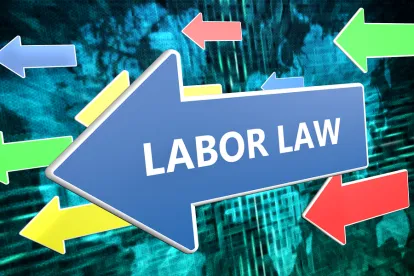This is a weekly post spotlighting labor topics in focus by the US legislative and executive branches during the previous week. In this issue, we cover:
-
Biden Administration Labor Leadership Updates
-
“Forced Labor” Update
-
House Approves the Protecting Older Workers Against Discrimination Act
-
NPRM for Tipped Workers Announced
-
Labor Department Grants Announced
-
USMCA Labor Enforcement Action
Biden Administration Labor Leadership Updates. On June 22, U.S. President Joe Biden announced his intent to nominate Mr. David Prouty to serve as a Member of the National Labor Relations Board (NLRB). Mr. Prouty currently serves as General Counsel of Service Employee International Union (SEIU) Local 32BJ, the largest labor union for property service workers in the country with over 175,000 members. He has a deep union background and previously served as a member of the NLRB’s Union Advisory Panel from 1997 to 1998.
“Forced Labor” Update. On 24 June, the White House announced a series of actions against what the Biden Administration asserts to be forced labor and products from the People’s Republic of China (“PRC” or “China”), including the Xinjiang Uyghur Autonomous Region (“Xinjiang”). The U.S. Department of Labor published a Federal Register Notice updating its “List of Goods Produced by Child Labor or Forced Labor,” to include polysilicon allegedly produced with forced labor in China. The report already included other products from the PRC suggested to be linked to forced labor, including cotton, garments, footwear, electronics, gloves, hair products, textiles, thread/yarn, and tomato products.
That same day, U.S. Customs and Border Protection issued a Withhold Release Order (WRO) on silica-based products made by Hoshine Silicon Industry Co., Ltd., a company located in Xinjiang, and its subsidiaries. The U.S. Department of Commerce also added five Chinese entities to the Entity List in connection with what the Department asserts to be participating in the practice of, accepting, or utilizing forced labor involving Uyghurs and other Muslim minority groups in Xinjiang. The Entity List is a tool utilized by the Bureau of Industry and Security (BIS) to restrict the export, re-export, and transfer (in-country) of items subject to the Export Administration Regulations (EAR) to persons (individuals, organizations, companies) reasonably believed to be involved, or to pose a significant risk of becoming involved, in activities contrary to the national security or foreign policy interests of the United States.
House Approves the Protecting Older Workers Against Discrimination Act. This week, House Education & Labor Committee Chairman Bobby Scott (D-Virginia) spoke on the House floor in favor of approving H.R. 2062, the Protecting Older Workers Against Discrimination Act. He stated the bill “would restore the pre-2009 evidentiary standard for age discrimination claims. It would effectively realign the burden of proof for age discrimination claims so it would, again, be the same standards for proving discrimination based on sex, race, religion, and national origin.” House Education & Labor Ranking Member Virginia Foxx (D-North Carolina) countered, arguing existing federal statutes already prohibit workplace discrimination. The House approved the bill that day by a vote of 247 to 178. Meanwhile, the Senate has not acted on its identical bill, S. 880.
NPRM for Tipped Workers Announced. On June 21, the Labor Department announced a Notice of Proposed Rulemaking (NPRM) to limit the amount of non-tip producing work that a tipped employee can perform when an employer is taking a tip credit. The proposed rule clarifies when an employee is working in a tipped occupation and when a worker has performed such a substantial amount of non-tipped labor that an employer can no longer take a tip credit and must pay the full federal minimum wage to the worker. Interested parties may submit public comments on the NPRM by August 23.
Labor Department Grants Announced. On June 21, the Department of Labor awarded 28 grants to organizations in 17 states and Washington, D.C., to assist individuals now or once involved in the criminal justice system with securing employment in their communities.
On June 22, the Labor Department awarded more than $130 million in grants to develop, modernize and diversify Registered Apprenticeship Programs in 15 states and to establish Registered Apprenticeship Technical Assistance Centers of Excellence in three states and Washington, D.C., which will provide technical expertise and services and accelerate the expansion of Registered Apprenticeship programs.
On June 23, the Department of Labor awarded five grants totaling $11.6 million to improve the delivery of training and employment services, and measure their effectiveness in Arkansas, Indiana, Maryland, Mississippi and New Mexico. The Workforce Data Quality Initiative grants seek to help states increase the capacity of workforce development programs and improve the quality and range of workforce data to benefit workers, job seekers and employers.
USMCA Labor Enforcement Action. On June 19, Mexico’s Ministry of Economy announced it would review a U.S. complaint under the U.S.-Mexico-Canada Agreement (USMCA) dispute settlement mechanism against an auto parts manufacturer in Mexico over alleged labor concerns. Earlier this month, the Office of the U.S. Trade Representative and U.S. Department of Labor agreed to take on a complaint filed by the AFL-CIO against Tridonex – an auto parts manufacturing plant in Matamoros, State of Tamaulipas – and whether workers are being denied the rights of free association and collective bargaining. According to USMCA dispute settlement timelines, the Mexican Government must share its findings with the United States by July 24.




 />i
/>i

